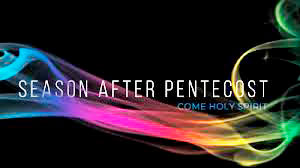
We know what did the Holy Spirit did in Jesus time at Pentecost. It energized them, bound them together gave them a mission to extend the Gospel into foreign lands
Pentecost is a season, not just one day. We have a long time in the church year to work with it ( Pentecost is the longest season until Advent. The celebration should be and is a part of Pentecost Sunday.
And after that?
We have to know who we are. Based on that what is our mission?
Who are we ?
Luke casts the church as a spirited community of bridge-builders, visionaries, and dreamers, male and female, slave and free (Acts 2:17)
Hopefully, our churches have “visionaries and dreamers” but also those that can organize to implement the change, work for funding if necessary and report back what we done. (Thank goodness we have no slaves.)
What is our mission?
So what are we supposed to do in our time during Pentecost? Much of what was done at the original Pentecost and beyond.
From SALT -” The portrait of the Spirit in Acts draws on ideas at least as ancient as the vision in Numbers, in which God’s “breath” or “spirit”) in Hebrew — brings renewal, insight, and responsibility, such that “all God’s people were prophets” (Numbers 11:29). But for all the drama, Pentecost is only the beginning: throughout the Book of Acts, again and again, the Spirit mobilizes the church and opens up new horizons for ministry (see Acts 4, 8, 10, 13, 15, 19, and so on). Breath means new life — and new life means new growth, change, and ongoing development. The Spirit protects, but also challenges, provoking and pushing us along, calling us to open up. Jesus’ kingdom was all about extending love to our fellow human beings.
Luke describes kingdom making activities. Christ continues to bring good news to the poor, proclaim release to the captives, heal the blind, free the oppressed, and proclaim God’s favor. (Luke 4.18-19)
The neat thing is that what we do externally also brings a change in us for future activities. Richard Rohr, Catholic theologian write that once we find the “inner spring” within ourselves, which is the Holy Spirit (John 7:37-39), we finally begin to be who we really are.
From David Lose “And Jesus challenges all of that by telling us that the only things we can hold onto are the things we give away: like love and mercy and kindness and compassion.”
What do we bring to this?
Our goal is to use the Holy Spirit and we are helped by the gifts provided by the Holy Spirit
What are the Episcopal gifts of the Spirit? The gifts are 1 ) wisdom, 2) understanding, 3) counsel, 4) fortitude, 5) knowledge, 6) piety, and 7) fear of the Lord. The imparting of the gifts of the Spirit is associated with baptism, as well as Confirmation and Ordination.
So we need to look for possibilities for extending the Kingdom of God using our gifts of the spirit in both our personal lives and communal lives. lives. Communal activities may be hard. President Kenndy said that the hard things “will serve to organize and measure the best of our energies and skills.”
Extending the kingdom personally may be easier. It can be as simple as visiting in hospitals and helping the family of the hospitalized. It could be organizing your neighborhood to make the environment a better place by picking up trash. Much of kingdom is in simple things which some may consider to be mundane activities. Look at your world and decide what you can do to make it better.
In any case, there is so much to do. We just need to get busy during Pentecost and after.
